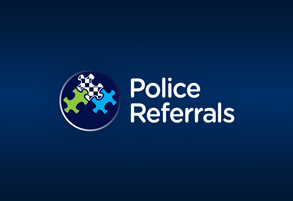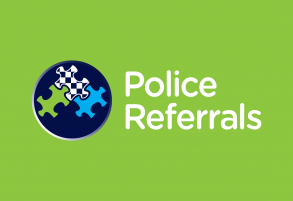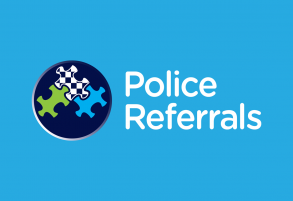In this issue
- A look back at 2019
- Good News Story
- Service Provider Spotlight – Benevolent Society – Beenleigh/Bayside
- We welcome new services!
- Making it easier with auto-response – Interested?


Making it easier – Auto-response function!
Set and Forget – Quick and Easy Utilising the auto-response functionality helps your service to empower the client and is a set and forget option that RMCS configure for you with your approval. Once configured each client referred to your service will automatically be sent an SMS/EMAIL with your services …
Making it easier – Auto-response function!
Set and Forget – Quick and Easy
Utilising the auto-response functionality helps your service to empower the client and is a set and forget option that RMCS configure for you with your approval.
Once configured each client referred to your service will automatically be sent an SMS/EMAIL with your services contact number or website details so they can phone you should they wish.
The aim of this functionality is to give the client your details to ensure they can phone you when they are ready, at time of referral or in the future.
By setting up an Auto-Response it does not negate the need to make 3 attempts at contact with the client. However we believe it adds to the Police Referral Process to ensure clients are empowered with service provider information they can use when they are ready.
For more information on the SMS/EMAIL and Auto-Response functionality please email or call the RMCS team.

First Provider Spotlight of 2020
Benevolent Society – Beenleigh/Bayside! About the Service Provider, location, how long in operation, number of staff, number of clients seen each year approximately, areas of …
First Provider Spotlight of 2020
Benevolent Society – Beenleigh/Bayside!

About the Service Provider, location, how long in operation, number of staff, number of clients seen each year approximately, areas of speciality (in particular in relation to Police Referrals).
Family & Child Connect [FaCC] services are funded by the Department of Child Safety, Youth and Women, and have been established to support families who are at risk of entering or re-entering the child protection system. FaCC are local, community-based services that help families to care for and protect their children at home, by connecting them to the right services at the right time. Broadly, this may look like provision of information, advice and referral to necessary supports and services. Please note that FaCC services do not provide case management.
Family and Child Connect operates from 8.30am to 5.30pm Monday to Friday (excluding public holidays), with offices located across Queensland. Prescribed entities under the Child Protection Act 1999 can complete referrals to our service without consent from the family where necessary, however non Prescribed Entities do require consent from the family before completing a referral. Families can also self-refer by contacting FaCC services directly. Referrals can be made by completing the referral form at https://qld-families-referrals.infoxchangeapps.net.au/ or contacting 13 FAMILY (13 32 64).
Referral criteria:
- the referred family has a child under 18 years of age, and
- the child is not currently in need of protection, and
- without support the child, young person and family are at risk of entering or re-entering the statutory child protection system, and
- the family would benefit from access to intensive and specialist support services, either:
- active engagement provided by FaCC, or
- case management and intervention services provided by an intensive family support service
- the family has multiple and/or complex needs;
- There is at least one family member presenting with behaviours or circumstances that are having negative consequences for the family, particularly children. Consider if there is:
- more than one issue impacting on the child or family’s wellbeing; or
- there is a complex issue/s impacting on the child or family’s wellbeing. Examples of issues include, but are not limited to: family violence, parenting challenges, mental health, substance misuse, learning difficulties, housing instability and financial stress.
Number of Police Referral Clients they’ve worked with, average length of time for client engagement, most successful client outcome (or 2)
In the 2018-2019 financial year FaCC received approx. 247 referrals via QPS Redbourne
Upon receiving a referral via QPS Redbourne, attempts are made to contact the family within 2 business days to offer support. In some cases, information and/or advice is able to be provided to the family at the time of the call and the referral is then closed. Alternatively, if there are multiple and complex issues identified within the referred household and further assessment or referral to services is required, an active engagement case is opened with the family and work can occur for a period of up to 6 weeks with a goal of service connection.
Thoughts on the importance of the Police Referral Service / the value they get from it / they see clients gaining from it / suggestions for improvements.
With regards to the importance of Police Referral service:
QPS are often first responders when families are experiencing times of stress. During these times, it is encouraging to know QPS can be a pathway for families to connect with appropriate supports, at the right time. During times of stress, families are not always able to articulate their worries and/or needs. With a referral to FaCC, Child and Family Practitioners are able to have conversations with the family directly, sometimes when issues leading to QPS contact have de-escalated, allowing FaCC to complete a holistic assessment in relation to areas of strength and need.
With regards to suggestions for improvements, we have identified:
- Importance of consent being obtained from the family prior to referring a family to FaCC;
- Including as much information as possible in the referral regarding the incident leading to QPS involvement, as well as any risks/safety issues to FaCC workers in engaging with the family;
- Ensuring contact details provided for the family are correct and current;
- Ensuring there are children in the home under the age of 18, and concerns being reported have, or could lead to, an impact on the wellbeing of the children in the home;

Good News Story!
Partnership Response at Domestic Occurrences (PRADO) case study 2019 This is just one of many ‘good work stories’ as a result of the QPS Redbourne …
Good News Story!
Partnership Response at Domestic Occurrences (PRADO) case study 2019
This is just one of many ‘good work stories’ as a result of the QPS Redbourne Referral system and the collaboration between police and PRADO.
A client was referred to PRADO in November 2019 by way of the QPS Rebourne referral system. The referral was made following a domestic violence incident at her home address. Police had attended in the past and having concerns for the aggrieved had applied for a protection order. This order was granted for 5 years in order. Due to extenuating circumstances, the aggrieved allowed the respondent (ex-partner and father of her children) to stay temporarily at her home address. The aggrieved did this to try and support the respondent who was going through a tough time and she was hoping he would be able to support her caring for their children while she completed her university studies. The home situation did not work out. The respondent started to use controlling behaviours and physical violence towards her. PRADO provided on going emotional support, case management, awareness/education of domestic violence, cycle and impacts on herself and her children. PRADO provided weekly safety planning. Using the DVPO, the aggrieved was able to enforce the respondent to leave her address. PRADO made a referral for home security upgrades, as the she was concerned the respondent’s behaviour may escalate. She felt supported by both police and PRADO. She felt comfortable to reported breaches of the protection order to police and the respondent has been charged. The client receives ongoing support from PRADO.

Welcome to the Police Referrals network!
A big welcome to the Services who have commenced being part of the Police Referral Network. Neami National Health Service Navigator Strengthening Family Connections Selectability …
Welcome to the Police Referrals network!
A big welcome to the Services who have commenced being part of the Police Referral Network.

QPS Update – A look back at the year that was 2019!
Chris’s corner… 2019 what a year it was for Police Referrals involving some significant travel for the Police Referrals team around Queensland. We attended various …
QPS Update – A look back at the year that was 2019!
Chris’s corner…
2019 what a year it was for Police Referrals involving some significant travel for the Police Referrals team around Queensland. We attended various police districts within the second part 2019, conducting District Engagement workshops with both Police and Service Providers. These workshops proved to be an invaluable experience for both Police and Service Providers, not only to connect with their local police/service providers but also to understand and showcase what part each party plays to assist our vulnerable persons of Queensland via Police Referrals.
During these District Engagement sessions, the Police Referral teams were able to provide guidance, advice and tips for Police and Service Providers regarding the model police referral process, including emphasis on Quality vs Compliance. It was also an opportunity for Police and Service Providers to collaborate, enhance interagency communications and form an understanding of the whole Police Referral process.
The model police referral process consists of the following five (5) points:
- Inform and Consent
Ensure the referred client has been ‘Informed’ of the process/what will happen, and ‘Consent’ has been obtained from the client.
- Contact Details
Confirm referred client’s contact details are correct/updated prior to completing the Police Referral. This enhances the ability for Service Providers to contact the referred client to provide required support or connect referred client with another more appropriate service.
- Most appropriate referral category
This aligns with the theme ‘See the Person’ make every contact count, is there more going on than meets the eye?
Referring against the most appropriate referral category could mean the difference between someone receiving the correct support initially vs multiple police engagements.
For example: Is the client requiring support for homelessness? By seeing the person, it may be identified that the client is homeless due being struck with grief of the recent passing of a family member or friend, they’re unable to attend work, the client subsequently lost their job and was no longer able to pay their rent/mortgage. This client may benefit from a referral for Homeless, Grief Counselling and Financial Counselling.
- Safety Concerns
As more Service Providers are utilising some of the available system functionality e.g. Email and SMS functions to contact the referred client prior to engaging by phone or provide information to the referred client where there are no other safe means of contact
- Occurrence Summary
Reminding Police this field is often the only free text field police have to provide information to the Service Provider. Providing information within this field for the Service Provider can:
- reduce the possibility of re-traumatisation for the referred person having to repeat the information recently told to police, to the Service Providers
- provide valuable additional safety information for those Service Providers who offer outreach services
- assists Service Providers to triage referrals internally and on refer to other Service Providers if required
We would like to thank those Service Providers and Police who were able to attend our District Engagement sessions in 2019.
So as 2020 commences, we thank each and every one of you for the part you play in building safe, caring and connected communities and we look forward to working more with everyone in 2020 to continue providing the great services that we do..
Acting Senior Sergeant Chris Stafford








